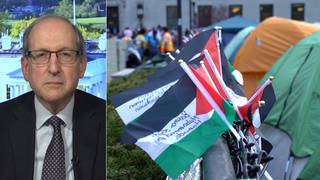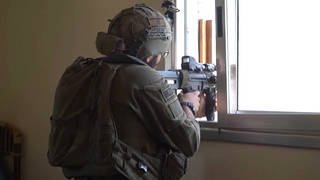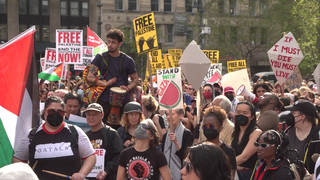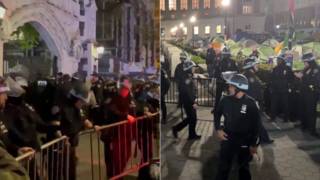
Related
As the U.S. moves ahead with a massive arms deal with Saudi Arabia, Saudi’s king has deposed his nephew as crown prince and has replaced him with his son—the same man presiding over the devastating U.S.-backed, Saudi-led war in Yemen. The move comes a month after President Donald Trump signed a series of arms deals with Saudi Arabia totaling a record $110 billion during a visit to Riyadh. The arms deal includes tanks, artillery, ships, helicopters, missile defense systems and cybersecurity technology. We speak to Kristine Beckerle of Human Rights Watch.
Transcript
AMY GOODMAN: We begin today in Saudi Arabia, where King Salman has deposed his nephew as crown prince and replaced him with his own son, Mohammed bin Salman bin Abdulaziz, who currently serves as defense minister and has been presiding over the devastating U.S.-backed, Saudi-led war in Yemen. In response to the news, The Huffington Post’s foreign affairs reporter Akbar Shahid Ahmed tweeted, “This is HUGE. Man he is replacing was against Qatar crusade+Yemen war. Saudi is doubling down on its most controversial actions,” he wrote.
Last month, President Donald Trump signed a series of arms deals with Saudi Arabia totaling a record $110 billion during a visit to Riyadh. The arms deal includes tanks, artillery, ships, helicopters, missile defense systems and cybersecurity technology.
United Nations monitors have warned previous Saudi-led attacks on Yemen could constitute crimes against humanity. More than 10,000 people have died amidst the ongoing U.S.-backed, Saudi-led war in Yemen, which has also destroyed Yemen’s health, water and sanitation systems, sparking a deadly cholera outbreak. The United Nations warns some 19 million of Yemen’s 28 million people need some form of aid, with many of them at risk of famine.
For more, we’re joined now by Kristine Beckerle, the Yemen and UAE researcher for Human Rights Watch. She was in Yemen earlier this year. Human Rights Watch and the Associated Press have just revealed the existence of a secret network of prisons in southern Yemen where prisoners are tortured.
We’re going to begin, Kristine—thanks so much for joining us—with the change, the shakeup in Saudi leadership. Explain the significance of the king now replacing his nephew with his son as crown prince.
KRISTINE BECKERLE: So, I think when I sort of saw the news yesterday, my first feeling was of surprise, and then my second feeling was of dread, because my interaction with the idea of Mohammed bin Salman is through—been through the war in Yemen. He serves as—he was the deputy crown prince and the defense minister, so he was the Saudi official responsible for the ongoing military campaign in Yemen. And when you say that, it’s not sort of just because he was the defense minister, but also because when people talk about the war in Yemen, they talk about Mohammed bin Salman and how he has been a, really, driver of this war. And—
AMY GOODMAN: He’s very young. He’s 31.
KRISTINE BECKERLE: And he’s—yeah, he’s a kid, basically. And when you talk about what is going on in Yemen, and you look at the actions of Saudi Arabia and the coalition it’s leading, it’s very hard to see a policy or a plan or a strategy, but it’s very easy to see devastation wrought on a country for two-and-a-half years. You’ve got famine, cholera and repeated war crimes and violations of the laws of war.
So, when you say you’re going to give this person more power, and we haven’t seen this person commit to rights reforms, we’ve seen this person oversee a massive campaign that’s been marred by numerous abuses, and we’ve seen the new U.S. administration, Donald Trump, court this young prince and say, in his first trip abroad, that he’s going to go to Riyadh and he’s going to sell the Saudis $110 billion worth of arms—so I think the question now becomes: With this new power, is Mohammed bin Salman going to take the step forward and say, “OK, now I’m going to push rights reforms,” or are we going to see more of this reckless and sort of dangerous and very destructive policies that we’ve been seeing out of Saudi?
AMY GOODMAN: And the crown prince he replaced, his cousin, the king’s nephew?
KRISTINE BECKERLE: Yeah. Muhammad bin Nayef also was implicated in many abuses, because he oversaw the Interior Ministry. So, Saudi’s Interior Ministry has been, for a long time, sort of a centerpiece of, you know, prosecutions of dissidents, prosecutions of women’s rights activists, all of these sorts of things, abuse in detention facilities. So, the idea—the hope would be that with the replacement of Muhammad bin Nayef and the new Interior Ministry, Saudi would take it as an opportunity to push reforms. But the question is: Is Mohammed bin Salman, again, a man we have not seen commit to human rights reforms and the reforms needed in Yemen or at home, going to do those things?
AMY GOODMAN: And talk about what’s happening in Yemen right now and the significance of this arms deal that President Trump made with Saudi Arabia—again, Saudi Arabia, the first foreign country that he visited as president of the United States.
KRISTINE BECKERLE: Yeah, so I think—I mean, one of the reasons why we at Human Rights Watch, other human rights groups talk about arms deals is not simply because of the fact of the arms deals, but the signal it ends. So, the—Donald Trump going to Riyadh on his first trip abroad as president, saying in a speech that he praises Saudi Arabia’s strong action in Yemen, not mentioning human rights concerns, and then saying, “By the way, here’s another $110 billion worth of arms,” sends a pretty clear message that “It’s OK. Keep doing what you’re doing. Keep carrying out war crimes. Keep devastating the Yemeni civilian population. And we’ll still give you weapons.”
And the reason that’s significant is not only because the U.S. should care about the ways in which its weapons are being used in Yemen, but also because it exposes the U.S. and U.S. officials to legal liability for aiding and abetting coalition war crimes in Yemen. So Human Rights Watch has already found remnants of a weapon produced seven months after the start of the war, after violations were clear, at the site of an apparently unlawful attack in Yemen that killed over 30 civilians. And now we’re saying, “Don’t worry. Here are some more weapons that you might be able to use in the war in Yemen.” And that’s significant both for the Yemeni civilian population and for U.S. officials who are exposing themselves to potential legal liability.












Media Options